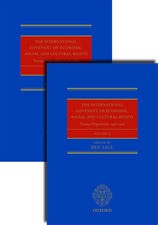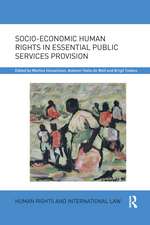The Responsibility to Protect in Libya and Syria: Mass Atrocities, Human Protection, and International Law: Routledge Research in International Law
Autor Yasmine Nahlawien Limba Engleză Hardback – 21 noi 2019
The book dissects each of R2P’s three component pillars to examine their international legal underpinnings, drawing upon diverse legal frameworks – including the laws of the UN, laws of international organisations, human rights law, humanitarian law, criminal law, environmental law, and laws of State responsibility – to extract conclusions regarding existing and emerging host and third-State obligations to prevent and react to mass atrocity crimes. It uses this legal grounding to critically examine specific aspects of the Libyan and Syrian R2P cases, engaging with some of the more traditional debates surrounding R2P’s application, most notably those that pertain to the use of force (or lack thereof), but also exploring some of the less-researched non-military methods that were or could have been employed by States and international organisations to uphold the doctrine. Such an analysis captures the diversity in the means and actors through which R2P can be implemented and allows for the extraction of more nuanced conclusions regarding the doctrine’s strengths and limitations, gaps in enforceability, levels of State support, and future trajectory.
The book will be of interest to scholars and students in the field of international law and human rights law.
| Toate formatele și edițiile | Preț | Express |
|---|---|---|
| Paperback (1) | 384.09 lei 6-8 săpt. | |
| Taylor & Francis – 13 dec 2021 | 384.09 lei 6-8 săpt. | |
| Hardback (1) | 763.26 lei 6-8 săpt. | |
| Taylor & Francis – 21 noi 2019 | 763.26 lei 6-8 săpt. |
Din seria Routledge Research in International Law
-
 Preț: 296.42 lei
Preț: 296.42 lei -
 Preț: 151.71 lei
Preț: 151.71 lei -
 Preț: 311.94 lei
Preț: 311.94 lei -
 Preț: 311.70 lei
Preț: 311.70 lei - 8%
 Preț: 376.51 lei
Preț: 376.51 lei -
 Preț: 281.27 lei
Preț: 281.27 lei - 18%
 Preț: 1053.16 lei
Preț: 1053.16 lei -
 Preț: 484.47 lei
Preț: 484.47 lei -
 Preț: 282.62 lei
Preț: 282.62 lei -
 Preț: 410.46 lei
Preț: 410.46 lei - 18%
 Preț: 1054.75 lei
Preț: 1054.75 lei - 18%
 Preț: 729.62 lei
Preț: 729.62 lei -
 Preț: 422.04 lei
Preț: 422.04 lei - 18%
 Preț: 1054.71 lei
Preț: 1054.71 lei - 18%
 Preț: 1074.44 lei
Preț: 1074.44 lei - 18%
 Preț: 1057.89 lei
Preț: 1057.89 lei - 18%
 Preț: 1060.52 lei
Preț: 1060.52 lei - 18%
 Preț: 1058.43 lei
Preț: 1058.43 lei -
 Preț: 452.27 lei
Preț: 452.27 lei -
 Preț: 451.41 lei
Preț: 451.41 lei -
 Preț: 419.11 lei
Preț: 419.11 lei - 28%
 Preț: 822.34 lei
Preț: 822.34 lei -
 Preț: 494.07 lei
Preț: 494.07 lei - 18%
 Preț: 1118.46 lei
Preț: 1118.46 lei -
 Preț: 498.48 lei
Preț: 498.48 lei -
 Preț: 490.25 lei
Preț: 490.25 lei - 18%
 Preț: 1178.15 lei
Preț: 1178.15 lei -
 Preț: 444.62 lei
Preț: 444.62 lei - 18%
 Preț: 1050.78 lei
Preț: 1050.78 lei -
 Preț: 454.22 lei
Preț: 454.22 lei - 12%
 Preț: 301.05 lei
Preț: 301.05 lei -
 Preț: 419.32 lei
Preț: 419.32 lei - 18%
 Preț: 1052.38 lei
Preț: 1052.38 lei - 18%
 Preț: 1111.87 lei
Preț: 1111.87 lei - 18%
 Preț: 1112.21 lei
Preț: 1112.21 lei - 15%
 Preț: 550.99 lei
Preț: 550.99 lei - 18%
 Preț: 1054.71 lei
Preț: 1054.71 lei -
 Preț: 422.91 lei
Preț: 422.91 lei -
 Preț: 286.51 lei
Preț: 286.51 lei - 18%
 Preț: 1117.88 lei
Preț: 1117.88 lei
Preț: 763.26 lei
Preț vechi: 1102.21 lei
-31% Nou
Puncte Express: 1145
Preț estimativ în valută:
146.05€ • 152.87$ • 121.56£
146.05€ • 152.87$ • 121.56£
Carte tipărită la comandă
Livrare economică 31 martie-14 aprilie
Preluare comenzi: 021 569.72.76
Specificații
ISBN-13: 9781138618657
ISBN-10: 1138618659
Pagini: 216
Dimensiuni: 156 x 234 x 21 mm
Greutate: 0.4 kg
Ediția:1
Editura: Taylor & Francis
Colecția Routledge
Seria Routledge Research in International Law
Locul publicării:Oxford, United Kingdom
ISBN-10: 1138618659
Pagini: 216
Dimensiuni: 156 x 234 x 21 mm
Greutate: 0.4 kg
Ediția:1
Editura: Taylor & Francis
Colecția Routledge
Seria Routledge Research in International Law
Locul publicării:Oxford, United Kingdom
Public țintă
PostgraduateCuprins
Table of Contents
List of Cases
Acknowledgments
List of Acronyms
Chapter 1: Introduction
1.1 This Book at a Glance
1.1 Book Structure
Chapter 2: Contextualising the Emergence of the Responsibility to Protect
2.1 Introduction
2.2 Ongoing Trends in the International Legal System
2.2.1 From Bilateralism to Community Interests
2.2.2 From Discretion to Obligation
2.3 Emergence of R2P
2.4 Conclusion
Chapter 3: R2P’s Pillar 1
3.1 Introduction
3.2 Defining the Mass Atrocity Crimes
3.2.1 Genocide
3.2.2 War Crimes
3.2.3 Crimes Against Humanity
3.2.4 Ethnic Cleansing
3.3 Conclusion
Chapter 4: R2P’s Pillar 2
4.1 Introduction
4.2 Pillar 2 under International Law
4.2.1 Responsibility or Obligation?
4.2.2 Relevant (Emerging) International Legal Norms
4.3 Conclusion
Chapter 5: R2P’s Pillar 3
5.1 Introduction
5.2 Existing and Emerging Obligations to React to Mass Atrocity Crimes
5.2.1 Genocide
5.2.2 War Crimes
5.2.3 Article 41 of the Articles on State Responsibility
5.2.4 Working towards an R2P Pillar 3 Obligation
5.3 UN Security Council
5.3.1 The Permanent Veto
5.3.2 Alternatives to the UN Security Council 5.3.2.1 Uniting for Peace Mechanism
5.3.2.2 Regional Authorisation
5.4 Conclusion
Chapter 6: The Application of R2P to the Libya Case
6.1 Introduction
6.2 Regional Organisations
6.2.1 Libya’s Suspension from the League of Arab States
6.2.2 Regional Influence on International Action
6.3 UN Human Rights Council and General Assembly
6.4 UN Security Council
6.4.1 Security Council Resolution 1970
6.4.2 Security Council Resolution 1973
6.5 NATO
6.5.1 R2P and Regime Change
6.5.2 Interpretation of UN Security Council Resolutions
6.5.3 Ordinary Meaning of UNSC Resolution 1973
6.5.4 Object and Purpose of UNSC Resolution 1973
6.5.5 Supplementary Tools of Interpretation Pertaining to UNSC Resolution 1973
6.6 Conclusion
Chapter 7: The Application of R2P to the Syria Case
7.1 Introduction
7.2 UN Security Council
7.2.1 R2P in the UN Security Council
7.2.2 The Permanent Veto
7.2.3 General Measures
7.2.4 Chemical Weapons
7.2.5 Humanitarian Access
7.2.6 Accountability
7.2.7 Civilian Protection
7.2.8 Concluding Thoughts on the UN Security Council
7.3 League of Arab States
7.4 Non-State Actors
7.5 International Coalition against ISIS
7.6 Conclusion
Chapter 8: Conclusion
Bibliography
List of Cases
Acknowledgments
List of Acronyms
Chapter 1: Introduction
1.1 This Book at a Glance
1.1 Book Structure
Chapter 2: Contextualising the Emergence of the Responsibility to Protect
2.1 Introduction
2.2 Ongoing Trends in the International Legal System
2.2.1 From Bilateralism to Community Interests
2.2.2 From Discretion to Obligation
2.3 Emergence of R2P
2.4 Conclusion
Chapter 3: R2P’s Pillar 1
3.1 Introduction
3.2 Defining the Mass Atrocity Crimes
3.2.1 Genocide
3.2.2 War Crimes
3.2.3 Crimes Against Humanity
3.2.4 Ethnic Cleansing
3.3 Conclusion
Chapter 4: R2P’s Pillar 2
4.1 Introduction
4.2 Pillar 2 under International Law
4.2.1 Responsibility or Obligation?
4.2.2 Relevant (Emerging) International Legal Norms
4.3 Conclusion
Chapter 5: R2P’s Pillar 3
5.1 Introduction
5.2 Existing and Emerging Obligations to React to Mass Atrocity Crimes
5.2.1 Genocide
5.2.2 War Crimes
5.2.3 Article 41 of the Articles on State Responsibility
5.2.4 Working towards an R2P Pillar 3 Obligation
5.3 UN Security Council
5.3.1 The Permanent Veto
5.3.2 Alternatives to the UN Security Council 5.3.2.1 Uniting for Peace Mechanism
5.3.2.2 Regional Authorisation
5.4 Conclusion
Chapter 6: The Application of R2P to the Libya Case
6.1 Introduction
6.2 Regional Organisations
6.2.1 Libya’s Suspension from the League of Arab States
6.2.2 Regional Influence on International Action
6.3 UN Human Rights Council and General Assembly
6.4 UN Security Council
6.4.1 Security Council Resolution 1970
6.4.2 Security Council Resolution 1973
6.5 NATO
6.5.1 R2P and Regime Change
6.5.2 Interpretation of UN Security Council Resolutions
6.5.3 Ordinary Meaning of UNSC Resolution 1973
6.5.4 Object and Purpose of UNSC Resolution 1973
6.5.5 Supplementary Tools of Interpretation Pertaining to UNSC Resolution 1973
6.6 Conclusion
Chapter 7: The Application of R2P to the Syria Case
7.1 Introduction
7.2 UN Security Council
7.2.1 R2P in the UN Security Council
7.2.2 The Permanent Veto
7.2.3 General Measures
7.2.4 Chemical Weapons
7.2.5 Humanitarian Access
7.2.6 Accountability
7.2.7 Civilian Protection
7.2.8 Concluding Thoughts on the UN Security Council
7.3 League of Arab States
7.4 Non-State Actors
7.5 International Coalition against ISIS
7.6 Conclusion
Chapter 8: Conclusion
Bibliography
Notă biografică
Dr Yasmine Nahlawi is Research & Policy Coordinator at Rethink Rebuild Society through which she serves as an analyst and expert commentator on the Syrian R2P situation. She has presented in both UK and EU Parliaments and appears regularly on television and radio forums including Channel 4 and various BBC programmes to comment upon developments within the conflict. She holds a PhD in Public International Law and an LLM in International Legal Studies from Newcastle University, as well as a BSc in Political Science from Eastern Michigan University.
Recenzii
"Dr Nahlawi’s monograph is a very welcome addition to the growing literature on R2P. The book’s topical analysis examines thoroughly the applicability of R2P within the ongoing conflicts in Libya and in Syria, and draws important conclusions regarding the actual dimensions of R2P as this framework is being affected -essentially shaped- by these conflicts. The book explores a wide spectrum of means of reaction beyond the traditional ones, such as use of force. Most importantly, the monograph’s painstaking analysis identifies the actual dimensions of R2P’s lex lata within both primary and secondary international law."
Dr Vassilis Tzevelekos (Senior Lecturer in Law, University of Liverpool)
"This book enables a critical reflection on the fundamental underlying principles and pillars that hold the international legal order together and on the challenges that these present today by specific reference to the continuing mass atrocity situations in Syria and Libya. While one must acknowledge the careful balancing of state power that these principles aim to uphold, it is clear that they fail to take into consideration growing demands by a multitude of international actors for a more humanised system. The book challenges the existing legal gaps and provides a convincing, yet not uncontroversial, legal analysis of the mechanisms that can be utilised to address such gaps through Responsibility to Protect. This is a most valuable and timely contribution, and it is hoped that it will attract the attention that it deserves particularly among international decision makers."
Dr Elena Katselli (Senior Lecturer in Law, Newcastle Law School)
"Pulling together, repackaging, and building upon existing norms": using this methodical approach, the author analyzes not only the RtoP doctrine itself, but also solutions to circumvent all-too-common UN Security Council paralysis. This book is a particularly fascinating read for lawyers interested in the legacies of Libya and Syria for practical and doctrinal developments of the RtoP today."
Anjali Manivannan (Senior Programs Officer at the World Federalist Movement – Institute for Global Policy)
In Yasmine Nahlawi's masterful examination of the legal underpinnings of the Responsibility to Protect (R2P), she neither glorifies the doctrine nor glosses over its shortcomings. Rather, she adopts an approach akin to that of a physician, examining R2P in a clinical fashion at this most dire crossroads for its survival: where it is rooted, where it stands today, and where it can and should go from here.
Shannon Raj Singh (Visiting Fellow of Practice at Oxford University)
Dr Vassilis Tzevelekos (Senior Lecturer in Law, University of Liverpool)
"This book enables a critical reflection on the fundamental underlying principles and pillars that hold the international legal order together and on the challenges that these present today by specific reference to the continuing mass atrocity situations in Syria and Libya. While one must acknowledge the careful balancing of state power that these principles aim to uphold, it is clear that they fail to take into consideration growing demands by a multitude of international actors for a more humanised system. The book challenges the existing legal gaps and provides a convincing, yet not uncontroversial, legal analysis of the mechanisms that can be utilised to address such gaps through Responsibility to Protect. This is a most valuable and timely contribution, and it is hoped that it will attract the attention that it deserves particularly among international decision makers."
Dr Elena Katselli (Senior Lecturer in Law, Newcastle Law School)
"Pulling together, repackaging, and building upon existing norms": using this methodical approach, the author analyzes not only the RtoP doctrine itself, but also solutions to circumvent all-too-common UN Security Council paralysis. This book is a particularly fascinating read for lawyers interested in the legacies of Libya and Syria for practical and doctrinal developments of the RtoP today."
Anjali Manivannan (Senior Programs Officer at the World Federalist Movement – Institute for Global Policy)
In Yasmine Nahlawi's masterful examination of the legal underpinnings of the Responsibility to Protect (R2P), she neither glorifies the doctrine nor glosses over its shortcomings. Rather, she adopts an approach akin to that of a physician, examining R2P in a clinical fashion at this most dire crossroads for its survival: where it is rooted, where it stands today, and where it can and should go from here.
Shannon Raj Singh (Visiting Fellow of Practice at Oxford University)
Descriere
This book offers a novel and contemporary examination of the ‘responsibility to protect’ (R2P) doctrine from an international legal perspective and analyses how the doctrine was applied within the Libyan and Syrian conflicts as two recent and highly significant R2P cases.



























